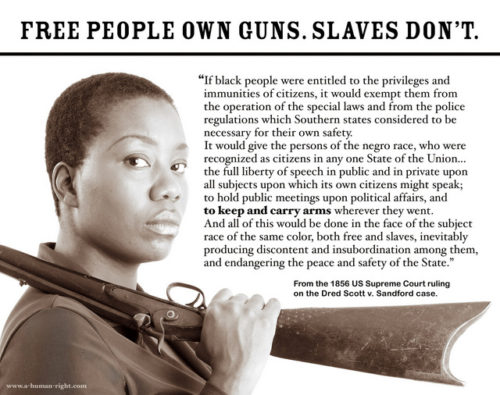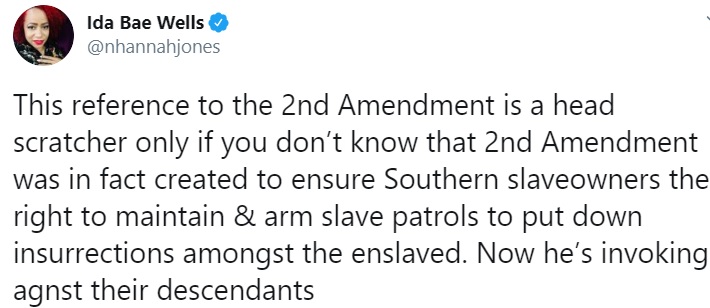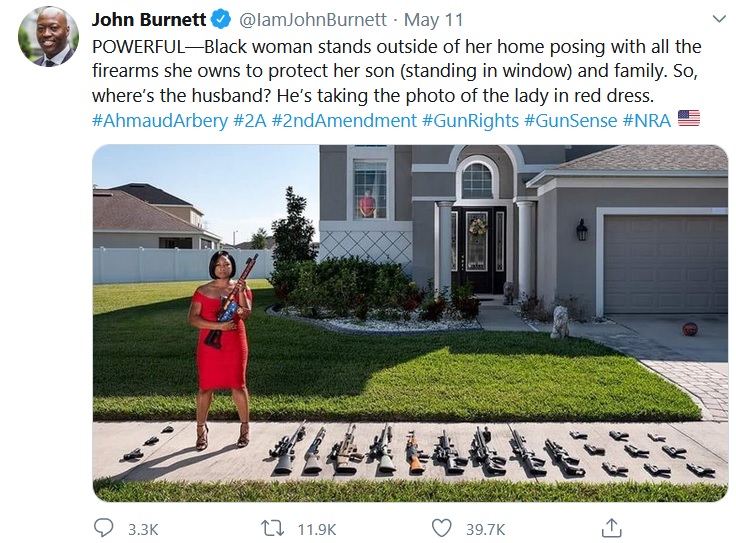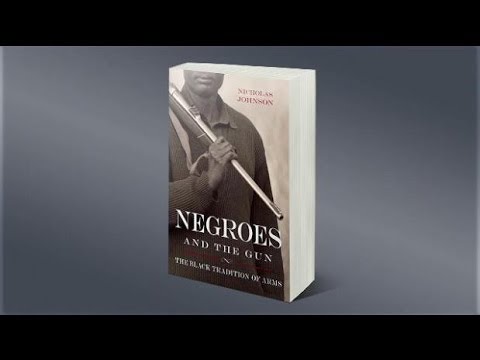by Dan Mitchell
Back in 2014, I wrote about “The Unsavory History of Gun Control” to document how many of the first gun control laws in the United States were used as a tool to oppress blacks.
Today, let’s take a closer look at this issue.
And since we have a lot of material, we’ll follow a chronological outline, first addressing some of the history of the 2nd Amendment, followed by some historical data on gun control, and closing with a look at growing support for gun rights in the African-American community.

Regarding the 2nd Amendment, I’ve written a couple of columns about the Constitution’s right to keep and bear arms.
But not everyone views that part of the Bill of Rights favorably.
Indeed, some people actually view gun rights as being a legacy of racism. Here’s a tweet from Nikole Hannah-Jones of the New York Times.

This is historically inaccurate.
Writing for National Review, David Harsanyi debunks the notion that the 2nd Amendment was created to help slaveowners.
There’s no historical evidence to suggest that the Second Amendment was “created to ensure Southern slaveowners the right to maintain & arm slave patrols to put down insurrections amongst the enslaved,” even if southerners subsequently used guns for their nefarious purposes. …The right to self-defense, in fact, is incompatible with the idea of slavery — it runs counter to the arguments made by the Founders, even if some of them were hypocrites… The animating ideas of the Second Amendment — both as personal and communal protection — are predicated on natural rights and English common law. And while nearly every intellectual, political, and military leader of the Founding generation stressed the importance of the right to bear arms as a means of preserving liberty, some of its most vociferous champions were against slavery. …The first American effort to codify and guarantee the right to bear arms was made in Pennsylvania, under a conference run by Benjamin Franklin, also president of the colony’s anti–slavery society. The second colony to do so was Vermont, where there were few slaves and no fear of a revolt. …What’s most ironic about Jones, who names herself after 19th-century civil-rights leader Ida B. Wells, is that the historic figure was a champion of the Second Amendment. She maintained…“that a Winchester rifle should have a place of honor in every black home, and it should be used for that protection which the law refuses to give.”
And David Kopel of the Independence Institute explains that gun control historically has been a tool used by racists.
If the Times’ project is historically accurate, then it will explain that America’s unique arms culture predates slavery, and historically developed in opposition to slavery. By contrast, American gun control had a close connection with slavery and the maintenance of a racial caste system. …Unlike American gun culture, gun control in America did grow out of slavery. …South of the Mason-Dixon line, various laws were enacted against unauthorized arms possession by slaves, and sometimes against free blacks as well. In the South, slave patrols searched slave quarters to look for unauthorized arms. …some people believe a bogus theory that the Second Amendment was created for the sole purpose of suppressing slave insurrections. But this can’t explain the ardent support for arms rights in Massachusetts, where slavery had already been abolished by 1791, or in Pennsylvania, where slavery was rare and already on its way to extinction. …former slave states quickly enacted laws banning firearms possession by blacks, or allowing such possession only with a government license. The Reconstruction Congress responded vigorously. The Second Freedmen’s Bureau Bill, the Civil Rights Act, and then the Fourteenth Amendment were all enacted with the express purpose of wiping out southern gun control.
Moving to the post-Civil War period, Tho Bishop explains, in an article for the Mises Institute, that the real legacy of racism is with those who want to curtail gun rights.
Prior to the passing of the 14th Amendment, eight states had gun control legislation that criminalized the possession of fire arms by non-white free citizens. Virginia required such individuals to receive government permission. Three additional states had constitutional language that specified that gun rights were reserved exclusively for white men. In order to maintain the horrific institution of slavery, the state had to disarm those most likely to empathize with its victims. While the “peculiar institution” was ended as a result of the Civil War, racially motivated gun control laws were not. While the 14th Amendment prevented states from explicitly mentioning race in legislation, state governments still managed to find ways to disarm black citizens. …these included laws that banned pistols that were not used by former Confederate officers, severe racial discrepancies in the penalty for unlawfully concealed carrying, as well as gun licensing requirements that, in the words of a future Florida Supreme Court Justice, were “passed for the purpose of disarming the negro laborers” and “was never intended to apply to the white population.”
And this becomes even clearer as we advance to the 1950s and 1960s.
Charles Cobb wrote an entire book about gun ownership and the civil rights movement. Here are some excerpts from the Amazon webpage.
Like King, many ostensibly “nonviolent” civil rights activists embraced their constitutional right to self protection—yet this crucial dimension of the Afro-American freedom struggle has been long ignored by history. In This Nonviolent Stuff’ll Get You Killed, civil rights scholar Charles E. Cobb Jr. describes the vital role that armed self-defense played in the survival and liberation of black communities in America during the Southern Freedom Movement of the 1960s. In the Deep South, blacks often safeguarded themselves and their loved ones from white supremacist violence by bearing—and, when necessary, using—firearms. In much the same way, Cobb shows, nonviolent civil rights workers received critical support from black gun owners in the regions where they worked. Whether patrolling their neighborhoods, garrisoning their homes, or firing back at attackers, these courageous men and women and the weapons they carried were crucial to the movement’s success. …Drawing on his firsthand experiences in the civil rights movement and interviews with fellow participants, Cobb provides a controversial examination of the crucial place of firearms in the fight for American freedom.
Writing for Reason, Thaddeus Russell reviews Cobb’s book and explains how armed blacks helped topple the racist laws imposed by Dixiecrats.
I have a dream that one day children in seventh grade will…read about people like C.O. Chinn. …Chinn was a black man in Canton, Mississippi, who in the 1960s owned…a large collection of pistols, rifles, and shotguns with which he threatened local Klansmen and police when they attempted to…intimidate civil rights activists working to desegregate Canton and register black residents to vote. …Although the Congress of Racial Equality (CORE) and the Student Nonviolent Coordinating Committee (SNCC) were formally committed to nonviolence, when their volunteers showed up in Canton they happily received protection from Chinn and the militia of armed black men he managed. …According to Charles E. Cobb’s revelatory new history of armed self-defense and the civil rights movement, This Nonviolent Stuff’ll Get You Killed, Canton and the rest of the South could not have been desegregated without people like C.O. Chinn… the original civil rights leadership publicly believed that, as Frederick Douglass put it in 1867, “a man’s rights rest in three boxes: the ballot box, the jury box, and the cartridge box.” …the Ku Klux Klan, whose primary mission was to disarm ex-slaves and thus was one of the first gun-control organizations in the United States. …Williams established an all-black chapter of the National Rifle Association (NRA) and used his NRA connections to procure “better rifles” and automatic weapons for his constituents. …the Monroe City Council banned Klan motorcades and, according to Williams, the KKK “stopped raiding our community.”
Adam Winkler, a law professor at UCLA, wrote for Huffpost about MLK and guns.
Martin Luther King Jr…kept firearms for self-protection. In fact, he even applied for a permit to carry a concealed weapon. …King had armed supporters take turns guarding his home and family. He had good reason to fear that the Klan in Alabama was targeting him for assassination. William Worthy, a journalist who covered the Southern Christian Leadership Conference, reported that once, during a visit to King’s parsonage, he went to sit down on an armchair in the living room and, to his surprise, almost sat on a loaded gun. Glenn Smiley, an adviser to King, described King’s home as “an arsenal.” …One lesson the gun advocates took was from the early King and his more aggressive followers: If the police can’t (or won’t) to protect you, a gun may be your last line of defense.
Makes this tweet from Iowahawk especially noteworthy.

Now let’s shift to modern times and consider how African-Americans are now more appreciative of the 2nd Amendment.
Here are excerpts from a story in the New York Times by Lela Moore.
…more than 100 people who responded when we asked black gun owners to tell us about their interactions with law enforcement, other authorities and the general public. …A quarter of black men and women in a 2017 Pew survey said they own guns. Some of those who wrote us said they have had no issues with authorities or the general public. Others said they have faced fearful store owners and had confrontations with law enforcement over guns they carried legally.
Here’s a sampling of responses from the article.
- I moved to Pocatello, Idaho, (a place where guns are very popular) from St. Louis, Mo., about eight years ago. I decided to purchase a firearm so that my 2-year-old son can learn to treat firearms with respect and know that they aren’t a toy. …since purchasing the gun, I’ve experienced a sense of camaraderie with a lot of conservatives who are deep in gun culture. — Andrew Casey, 32, Pocatello, Idaho. Gun owner for two years.
- At times, I’ve felt out of place when I’m one of the few people of color at shooting events or gun shows, but I’ve also been heartened to see other Americans of African descent and people of color there. People have been welcoming and willing to share information. …The Second Amendment is for everyone. I am the “good guy with a gun.” I’m just like you. — L. Kenton Dunn, 40, Charlotte, N.C. Gun owner for two years.
- I am black and transgender. …I tend to not discuss guns with fellow liberals anymore. They have shown they lack the capacity to discuss the issue with integrity, maturity and nuance. — Naomi Daniels, 33, Houston. Gun owner for two years.
- Law-abiding black people are just as motivated to defend themselves, their families and their homes as any other racial group. The right to bear arms has played a vital role in the lives of blacks for generations, and it will continue to do so. — Damon D. Colbert, 42, Alexandria, Va. Gun owner for 18 years.
In a column for the Foundation for Economic Education, Jon Miltimore opines on the growing support for firearms ownership in the black community.
Americans have the right to protect themselves and their property from violence, and some African-Americans are saying it’s past time that people of color embraced their constitutional right to arm themselves against threats. Rapper Michael Render (better known by his stage name “Killer Mike”) recently challenged the black community to reject the stigmatization of legal gun ownership and to find fresh solutions to preventing violence. …Nor is Render alone. Appearing on MSNBC in May following the death of Ahmaud Arbery, an unarmed 25-year-old black man fatally shot in Georgia, Charlamagne tha God said owning a firearm was a reasonable means of self-defense for African Americans. …”I would also tell all my brothers and sisters out there to go buy yourself a legal firearm and learn how to use it so you can protect yourself and your family.” …Render makes a similar observation. “I put this statement out because the police cannot always get to you on time, and the world is not a just place,” he writes.
Some black gun owners recently held a rally in Oklahoma, as reported by KFOR.Over a hundred people marched with their firearms in a Black gun owners rally to bring awareness to their Second Amendment rights. They started at the Ralph Ellison Library and made their way to the Governor’s Mansion.“It’s time that we let everybody know, especially those that may not be aware, that you can carry your weapons too and that you can protect yourself by any means necessary,” Michael Washington, the organizer, said. …“We’re trying to get Black people to understand the Second Amendment does not only apply to a certain ethnic group, that the Second Amendment applies to everybody.” Omowale said.
In his Boston Globe column, Jeff Jacoby celebrated expanding minority firearms ownership.
The gun control crowd isn’t having a good year. Americans have been buying firearms at a phenomenal pace. …First-time buyers have accounted for an estimated 40 percent of gun purchases in 2020,…and of those new gun owners, 40 percent have been women. …Black Americans in particular have been getting a pointed lesson in the value of their Second Amendment right to bear arms, and translating that lesson into action. …The National African American Gun Association, which began in 2015 with a single chapter in Atlanta, now comprises more than 100 chapters with 40,000 members — 10,000 of whom joined within the past five months. …Black gun ownership is as essential today as it was in 1892, when Ida B. Wells wrote that “a Winchester rifle should have a place of honor in every black home, and it should be used for that protection which the law refuses to give.”
In a piece for the New York Times, Tiya Miles rethinks the issue of gun control.
I am an African-American historian and, on the matter of guns and most other political issues, decidedly liberal. …I am anti-gun and support strict gun control laws. But…walking the floors where the Haydens and their compatriots had plotted what turned out to be the roots of a political revolution to overturn slavery, pried ajar a little door in my mind. …“Black abolitionists, especially those involved in the abolitionist underground and Vigilance Committees, tended to arm themselves … fugitive slaves, often resorted to armed self-defense when confronted by slave catchers and law enforcement.” The Underground Railroad activist Harriet Tubman was said to carry a revolver and did not hesitate to point it… In the tumultuous civil rights era of the 1950s and ’60s, black activists and community organizers openly took up arms. And not just those in the more explicitly militant Black Power movement. Martin Luther King Jr., several N.A.A.C.P. officials and other leaders perceived as much more dovish, still carried or stored weapons to defend their households and communities from potential attacks. …Maj Toure, founder of Black Guns Matter…is a former member of the N.R.A., and he told me in a phone interview that…he is critical of the N.R.A. for not doing more for urban Americans, he sees the group as an important civil rights organization. …Philip Smith founded the National African-American Gun Association in Georgia. …Mr. Smith stresses. “We have black Republicans, Democrats, gay, straight.” In what may come as a surprise to some, black women make up 60 percent of the association’s membership.
Kim Trent opines for USA Today about growing support for gun ownership in the black community.
African-American gun advocates argue that guns also preserved our ancestors’ peace when they were menaced by racists in the antebellum South and the divided North. …Kenyatta, co-founder of Detroit’s Black Bottom Gun Club,..believes that gun control measures are often a response to black Americans’ attempts to exercise their Second Amendment rights. He points to Michigan’s adoption of gun ownership restrictions after Ossian Sweet, a black physician who bought a house in a heretofore white Detroit neighborhood in 1925, used a shotgun to protect his family against an angry white mob. …on May 2, 1967, 30 or so fierce-looking members of the Black Panther Party for Self-Defense clad in leather coats entered the California Capitol toting loaded pistols and long guns. The Panthers were protesting proposed legislation they believed was targeting black militants’ right to use guns to protect themselves… They declared loudly that their right to carry the weapons was enshrined in the Second Amendment. …“Gun control has a racist past and present,” says Kenyatta.
Let’s close today’s lengthy column with some very good videos.
Here’s a video about black firearms ownership from the New York Times.
Here’s a video from the recent protests against gun control in Virginia.
This pro-2A protester in Richmond just blew the doors off of every Democrat talking point on guns: pic.twitter.com/gI2AGzItlc
— Caleb Hull (@CalebJHull) January 20, 2020
This may be my favorite because the guy says everything I would say, but does it even better.
Here’s a video reviewing some of the history we discussed above.
In this clip, Condoleezza Rice shares a first-person story about gun ownership helping blacks resist oppression.
And here’s a feel-good tweet showing people protecting their property with firearms.
Black militias are guarding black owned businesses with automatic rifles pic.twitter.com/YIzyHixFWc
— Zoomer Clips (@ZoomerClips) May 28, 2020
If you like feel-good stories (and assuming you’re not Michael Bloomberg), click here.
P.S. Here’s a family I’d like to have as neighbors.

P.P.S. For what it’s worth, while the intellectual case for gun control is dead, I fully expect Biden (assuming he wins in November) to push gun control next year. The silver lining to that dark cloud is that Americans of all races will engage in widespread civil disobedience.
Daniel J. Mitchell is a public policy economist in Washington. He’s been a Senior Fellow at the Cato Institute, a Senior Fellow at the Heritage Foundation, an economist for Senator Bob Packwood and the Senate Finance Committee, and a Director of Tax and Budget Policy at Citizens for a Sound Economy. His articles can be found in such publications as the Wall Street Journal, New York Times, Investor’s Business Daily, and Washington Times. Mitchell holds bachelor’s and master’s degrees in economics from the University of Georgia and a Ph.D. in economics from George Mason University. Original article can be viewed here.
Self-Reliance Central publishes a variety of perspectives. Nothing written here is to be construed as representing the views of SRC.

